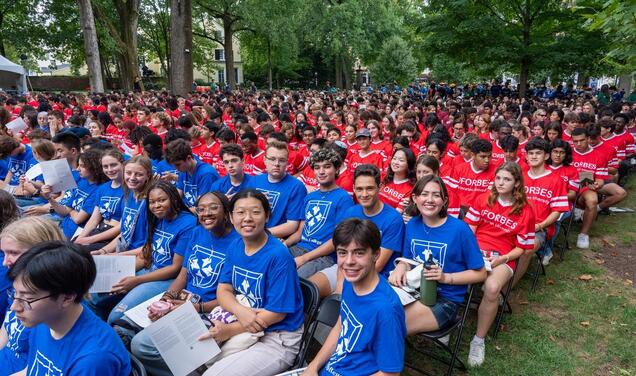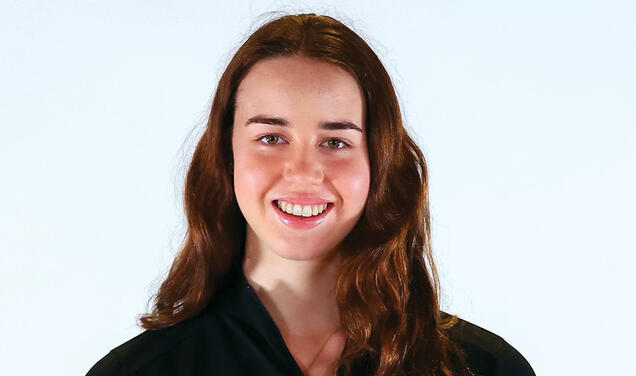There’s a New College President In Town
Dale Caldwell ’82 takes over at Centenary University after four decades in academia

At age 5, Dale Caldwell ’82 received a diploma from Harvard University. Well, sort of. He was part of a study focused on how kids learn language. That framed Scholar of Linguistics certificate proudly hangs in his home.
More prestigious degrees would follow — a bachelor’s in economics from Princeton, an MBA in finance from the Wharton School of the University of Pennsylvania, and a doctorate in education administration from Seton Hall University. On July 1, Caldwell will continue his path in academia as the 15th president of Centenary University in Hackettstown, New Jersey. Located in the Skylands Region of the Garden State, it was founded in 1867 by the Newark Conference of the United Methodist Church and today enrolls about 1,100 undergraduate students. It also boasts a national-level equestrian center.
“I’ve just fallen in love with the place,” says Caldwell of Centenary. “It’s really up to the small, nimble institutions to come up with some groundbreaking programs that help the community.”
In this new role, Caldwell’s duties will include establishing a vision for the university, reviewing academic programs, enhancing the student experience, partnering with alumni and the community, raising funds, and finding ways to collaborate with other universities. He’ll also be a professor of management.
“It’s really up to the small, nimble institutions to come up with some groundbreaking programs that help the community.”
— Dale Caldwell ’82
One of Caldwell’s long-term goals is to position Centenary as a university that is internationally known for its expertise in emotional well-being. Tal Ben-Shahar, a global expert on positive psychology, has been teaching a course on happiness studies at Centenary. In addition, Caldwell coined the term “urban traumatic stress disorder” to describe the continuous trauma that economically challenged residents of urban communities endure. “Tal and I are working now to combine our research to create the Centenary Emotional Well-Being Training for students of all ages, community-based organizations, governments, and small businesses,” says Caldwell.
This program dovetails with another initiative that Caldwell would like to create at Centenary: an entrepreneurship institute. A focus of the institute could be supporting “entrepreneur zones,” which aim to reduce poverty by providing support for entrepreneurs and job training for residents within economically challenged communities. To transform poor communities, says Caldwell, you need “to invest in entrepreneurs to make sure they’re successful. Universities are well positioned to make that connection.”
Caldwell is currently working to establish entrepreneur zones in Boston, Brooklyn, Chicago, and in New Jersey in Atlantic City, Camden, Hackettstown, Newark, New Brunswick, Newton, and Paterson.
As Caldwell continues to develop his vision for Centenary, he’ll refer to his eclectic mix of experiences for guidance.
Caldwell has written eight books, became the first Black consulting senior manager in the New York-New Jersey area for Deloitte, has led multiple K-12 education programs, and is currently the president of three school boards: the New Brunswick Board of Education, the Educational Services Commission of New Jersey, and the College Achieve Greater Asbury Park Charter School. He also founded the Black Tennis Hall of Fame (among others focused on educators, entrepreneurs, and inventors), taught tennis with Arthur Ashe, and wrote a chapter for Chicken Soup for the African-American Soul. More recently, he was executive director of the Rothman Institute of Innovation and Entrepreneurship at Fairleigh Dickinson University (FDU). At FDU, he also chaired the Diversity, Equity, Inclusion, and Accessibility (DEIA) Advisory Council, which secured a $1.2 million grant to bring in diversity trainers who also assessed the curriculum.
“My experience allows me to connect seemingly disparate parts of the institution together,” he says.
While reflecting on his achievements, Caldwell points out two foundational experiences in his life.
First, during his time at Princeton, he was the student coordinator for the Commons dining hall. “I’m really proud of this, probably more than anything,” he says. Student workers cleaned the facility and served 20,000 meals a week.
“It was a great training experience that gave me confidence, especially as one of the few African Americans at Princeton,” he says. “I became pretty much the highest-ranking student worker on campus.”
Another lifelong support pillar for Caldwell is tennis. He describes how his dad would look through the fence of a segregated country club in Galveston, Texas, where his father grew up. “He had a vow to himself that his firstborn son would play tennis,” says Caldwell.
“I grew up in Black communities, but I went to largely white schools, and tennis was kind of my foundation,” Caldwell explains. “It’s tough. If you’re the only Black person in the class it can be uncomfortable. People don’t realize that. And even if people don’t look at me as being different, you felt different. And so having something that you’re really good at helps you through.”
Caldwell played on the Princeton varsity B tennis team during his freshman and sophomore years, has been a United States Professional Tennis Association certified pro for 37 years, and was inducted into the Eastern Tennis Hall of Fame in 2021.
He adds, “Foundationally, tennis and the Commons dining hall leadership were kind of two things that have given me real support as I’ve gone through life many, many years later.”
Another fundamental influence for Caldwell has been his mother, a school teacher, and his father, a reverend and civil rights activist who marched with Martin Luther King Jr.
“My parents, their guidance and support gave me opportunities that other people didn’t have. The second you start believing your résumé, you’re in trouble. You say, well, I went to Princeton and I went to Wharton and I’m better than — no, I could be homeless on the street with different influences.”
Now, Caldwell, who lives in New Brunswick, New Jersey, wants to use his experiences to support others.
“People say, ‘Are you excited about this? Dale, you’re a college president,’” he says. “When we actually make a difference in people’s lives in the community, in the lives of the students, that’s when I will be jumping for joy.”










No responses yet